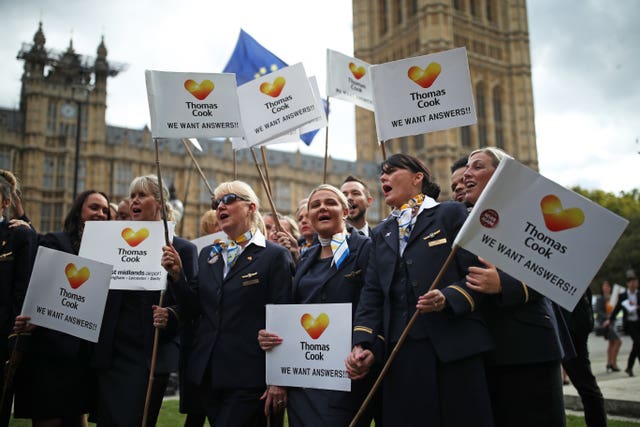Taxpayers will have to stump up £60m to fund unpaid wages, holiday pay and redundancy costs for Thomas Cook’s 9,500 staff following the travel firm’s collapse, according to early estimates. The cost is in addition to the government’s own £100m estimates for the biggest repatriation in living memory of 150,000 holidaymakers when the business went bust last month.
Politicians have slammed the management of Thomas Cook for its “shameful” behaviour in the run-up to the company’s collapse:
These workers have lost their jobs because of the shameful practices of Thomas Cook's directors.
They gave themselves £29 million in bonuses despite plummeting profits.
The government must take a public stake in Thomas Cook to secure this company and save 9,000 jobs. pic.twitter.com/gtChYZSDDl
— Jeremy Corbyn (@jeremycorbyn) October 2, 2019
“Thank you for your service and for getting stranded passengers home,” @jeremycorbyn tells Thomas Cook workers as they rally outside parliament. “It (Thomas Cook’s collapse) would not have happened under a Labour govt,” he adds. #ThomasCookCollapse #PayUpNow pic.twitter.com/85w6urTcJb
— Unite the union: join a union (@unitetheunion) October 2, 2019
It is simply insulting that Thomas Cook CEOs felt they could award themselves millions in bonuses whilst staff were losing their jobs and livelihoods. These funds could have been used to provide staff with a much-needed safety net. #PayUpNow pic.twitter.com/JpMhTBVkmu
— Thelma Walker (@Thelma_DWalker) October 2, 2019
Today I went to offer #solidarity ✊ & listen to ex-Thomas Cook workers in Westminster. These workers are demanding is answers. How come shareholders got paid millions in dividends before the collapse? How come investment offers were not pursued? How was this allowed to happen? pic.twitter.com/dxmaEGxpBR
— Laura Pidcock (@LauraPidcock) October 2, 2019
After raising the thousands of workers affected by the collapse of Thomas Cook in PMQs yesterday, I went outside to show solidarity to those protesting at Parliament pic.twitter.com/I5x1CsnrIC
— Diane Abbott (@HackneyAbbott) October 3, 2019
Thomas Cook had initially approached the Government prior to the collapse, asking for a £200m loan to make up a shortfall in funding to avoid going bust, but ministers declined – concerned that it would set an unhealthy precedent.
Bosses subsequently claimed they had found the funding but it was on the proviso that the Government would act as a guarantor against the loan. Again, ministers opted to not sign up, although the German government did fund Thomas Cook’s business in Germany.

Taxpayers picking up the bill for failed private firms
Around £18m has already been paid to staff, according to the Transport Salaried Staffs Association union, by the Insolvency Service from taxpayer funds.
The taxpayer has already picked up the bill for workers at collapsed firms Carillion and Monarch in recent years and in the first six months of 2019 paid out £110m, according to a Freedom of Information request by property adviser Altus Group.
But Thomas Cook workers are concerned they could be waiting several months to receive the full amount they are owed – with claims forms needing to be completed and processed.
The £60m figure was calculated by the PA news agency following conversations and analysis with industry insiders.
The statutory limit for redundancy payments is £525 a week. Insiders say the average payment for staff is eight weeks, meaning the amount is likely to be £40m for the 9,500 workers. Employees in the company’s high street stores, airlines and UK offices are also entitled to outstanding holiday pay. Based on an average of two weeks at the statutory rate of £525 a week, this works out at a further £10m.
Originally, the government wrote to some employees wrongly telling them they would not be entitled to holiday pay, but have since reassessed the claims. Of those 9,500 workers at Thomas Cook when it went bust, 3,500 were kept on by the Insolvency Service – the government department responsible for liquidating the business. The remaining 6,000 staff not retained will be owed unpaid salaries for three weeks – again at the £525 a week limit – adding a further £9.5m.
Staff “left high and dry by the directors”
Manuel Cortes, general secretary of the Transport Salaried Staffs Association, said he had been told by the liquidators that they have now processed 99% of the 5,000 claims they have received for redundancy payments.
“They have made interim payments totalling over £18 million, with more to follow. However, not every worker who lost their job has applied for redundancy. It’s vital they do so as quickly as possible,” he said.
He also pointed out that the compensation bill – which is funded by National Insurance contributions – could be far higher due to staff being dismissed without being given proper notice.
The union chief added: “Those who were dismissed without notice or consultation have a legal claim for compensation and we have asked the liquidator not to contest such claims.
“This will result in payments being made to our members in a more timely fashion and without having to resort to litigation.”
British Airline Pilots Association (Balpa) general secretary Brian Strutton told PA: “Staff at Thomas Cook have been left high and dry by the directors.
“It’s hard not to feel aggrieved at Thomas Cook management for this disaster.
“It is they who ran down cash so far that there isn’t even any left to pay wages owed, but did find the cash to keep the German airline, Condor, open for several days until the German government stepped in with some financing.”
The Insolvency Service said: “Redundancy payments for former employees of Thomas Cook are still being processed by the Redundancy Payments Service (RPS), and so we do not have a total figure available. All payments made by the RPS will be subject to statutory limits.”
The Business, Energy and Industrial Strategy (BEIS) Select Committee has launched an inquiry into the collapse, the BEIS Department has set up a taskforce, and the Financial Reporting Council, which regulates the accounting sector, is also investigating auditor EY’s involvement.

















